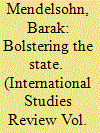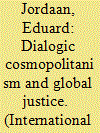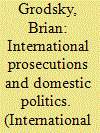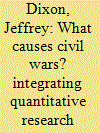| Srl | Item |
| 1 |
ID:
092999


|
|
|
|
|
| Publication |
2009.
|
| Summary/Abstract |
Looking beyond the military component of the global war on terrorism this article identifies a multilateral and multidimensional effort to revamp the state-based order. This effort is guided by four principles: (i) states are the primary actors in the confrontation with the jihadi movement, and state sovereignty must be respected in the various cooperative counterterrorism efforts; (ii) as members in the international society, states hold obligations to the collective not to allow terrorists to use their territories to harm other states; (iii) because numerous states are weak, a special effort must be made to bolster states' capacities so that they will be able to realize their obligations to the society of states; and (iv) the enormous demands of capacity building necessitate particular emphasis on interstate cooperation, including the provision of assistance for weak states and sharing of best practices. The article then presents two spheres of action in the war on terrorism, indicative of this general design: the regime to suppress the financing of terrorism and states' efforts to reinforce control over their borders. It concludes by arguing that the implications of the efforts to reinforce the state-based order require that we pay it much closer attention.
|
|
|
|
|
|
|
|
|
|
|
|
|
|
|
|
| 2 |
ID:
093002


|
|
|
|
|
| Publication |
2009.
|
| Summary/Abstract |
Although the term "cosmopolitan-communitarian debate" never really caught on, a national-global fault line remains prominent in debates about global justice. "Dialogic cosmopolitanism" holds the promise of bridging this alleged fault line by accepting many of the communitarian criticisms against cosmopolitanism and following what can be described as a communitarian path to cosmopolitanism. This article identifies and describes four key elements that distinguish dialogic cosmopolitanism: a respect for difference; a commitment to genuine dialogue; an open, hesitant and self-problematising attitude on the part of the moral subject; and an undertaking to expand the boundaries of moral concern to the point of universal inclusion. While offering much that is attractive, the dialogic cosmopolitan approach ultimately stumbles by failing to include large swathes of the global poor into the transnational moral community it aims to construct and by paying inadequate attention to matters of distributive justice.
|
|
|
|
|
|
|
|
|
|
|
|
|
|
|
|
| 3 |
ID:
093000


|
|
|
|
|
| Publication |
2009.
|
| Summary/Abstract |
Since the end of the Cold War, increased efforts at international criminal justice have begun to transform transitional justice for the worst cases of atrocities from a predominantly domestic affair to an international one. I examine side-effects of international pressure for criminal justice, arguing that political elites struggling to balance conflicting international and domestic demands may launch "compromise justice" policies designed to satisfy both, but which in effect weaken mechanisms that transitional justice scholars posit make postconflict reconciliation most likely. I apply this argument to the former Yugoslavia, examining Serbian and Croatian truth commissions as a form of "compromise justice.
|
|
|
|
|
|
|
|
|
|
|
|
|
|
|
|
| 4 |
ID:
093001


|
|
|
|
|
| Publication |
2009.
|
| Summary/Abstract |
Over the past decade, dozens of quantitative studies on civil war onset have been published. This study compiles the results of 46 quantitative studies, and finds that of more than 200 hundred independent variables, there is some degree of consensus on the effects of fewer than 30 and a high degree of consensus on no more than seven. Furthermore, many puzzles and contradictions in the existing research literature have barely been examined. The review concludes that while there is embryonic consensus on the effects of a small set of variables, there is not yet a widely accepted theory that explains these effects. Since neither qualitative nor quantitative analysis of civil wars has solved these puzzles, future studies of civil war onset should theorize the expected interactions between all variables of interest, collect data on variables with poor proxies, take grievances more seriously in theory and measurement, make use of the enormous quantity of historical scholarship on civil wars, and extend the concept of "multiple paths to war" to intrastate war.
|
|
|
|
|
|
|
|
|
|
|
|
|
|
|
|